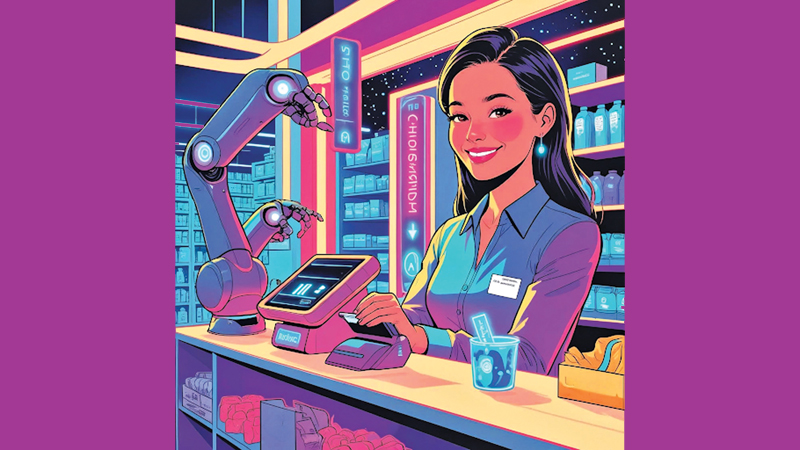Walk into any supermarket in Colombo today, and you’ll see a glimpse of tomorrow – self-checkout counters, digital loyalty apps, and smart inventory systems. From billing to back-end logistics, Artificial Intelligence (AI) is transforming how modern retail operates. The question on many minds from cashiers to C-suite executives is this: Will AI replace humans in stores?
While technology is undeniably advancing at a rapid pace, the answer is more nuanced. The short version? AI will not replace humans, but it will redefine their roles.
Let’s unpack why with a distinctly Sri Lankan lens.
Efficiency meets empathy
AI brings speed, accuracy, and data-driven insights into retail ecosystems. Supermarket chains in Sri Lanka are already deploying AI for predictive analytics forecasting demand, optimising shelf space, and minimising waste. For instance, AI can alert store managers when stocks of red lentils are running low before the Avurudu rush hits or suggest bundling discounts on soap and shampoo based on historical purchase behaviour.
But here’s what AI cannot do – read your facial expression when you’re overwhelmed trying to find the right brand of powdered milk. It won’t notice when a parent is juggling a crying toddler and offer to scan groceries a little quicker. And it certainly won’t laugh at the classic joke at the checkout.
Technology handles transactions; humans deliver experience.
The cultural context of shopping
Retail in Sri Lanka is inherently social. Whether at a supermarket in Colombo 7 or a retail store in Kurunegala, shopping is not just about acquisition; it’s about interaction. We talk, we inquire, we compare. Often, we even ask for cooking tips while picking out vegetables. A seasoned store employee doesn’t just know SKUs they know customer stories.
This human connection builds trust, which in turn builds loyalty. In global markets, some Amazon Go stores have checkout-free convenience powered entirely by AI and sensors. Yet, recent studies show many customers still prefer human interaction when available. Why? Because people buy from people, not platforms.
Augmentation, not replacement
The narrative that AI will eliminate jobs in retail is outdated. Instead, it will augment roles. Repetitive tasks such as stock taking, price checks, and basic customer queries can be handled by AI, freeing staff to engage more meaningfully with customers. In doing so, retailers create more value per human touchpoint.
For example, an AI system may identify that a certain type of detergent is popular among young families in a particular region. The on-ground team can then tailor conversations and upsell strategies accordingly, turning data into action. In this way, humans and machines operate in synergy each complementing the other’s strengths.
Why the future must embrace technology
Ignoring AI or resisting automation is not a strategy; it’s a liability. As customer expectations evolve, retailers who fail to modernise risk becoming irrelevant. Digital-first competitors, both local and global, are moving fast offering convenience, personalisation, and speed. The playing field is no longer defined by square footage but by customer-centric innovation.
Sri Lanka’s fintech and retail sectors must therefore adopt a “tech-enabled but human-led” approach. The future lies in hybrid models — where AI ensures operational efficiency and data intelligence, while humans focus on empathy, creativity, and problem-solving.
A new kind of workforce
This shift also demands new skill sets. Retail staff need to be trained not just in customer service but also in using digital tools, understanding data dashboards, and adapting to AI-enhanced environments. In essence, the employee of the future is not being replaced they’re being retooled.
And this evolution isn’t limited to supermarkets. From banking halls to fashion outlets, from pharmacy chains to co-operative stores every customer-facing business must prepare for this transformation.
Final thought: human first, tech forward
At the heart of it all, we must remember: AI can simulate intelligence, but not intuition. It can process sentiment, but not feel it. While technology will be central to retail’s growth, the businesses that win will be those that retain a human soul.
AI may power the aisles, but it’s still the people the warm greetings, the helpful gestures, the familiar smiles that make customers return.
And in a country such as ours, that human smile will always be priceless.
The writer is Head of Marketing, CrossBorder Payments (Pvt) Ltd.








